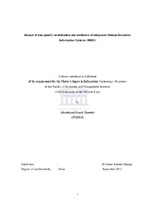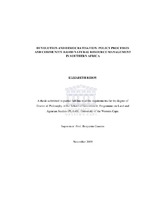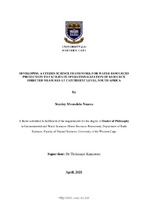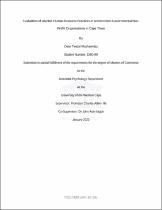Impact of data quality on utilisation and usefulness of integrated Human Resources Information Systems (HRIS)
Abstract
Impact of data quality on utilisation and perceived usefulness of integrated Human Resources Information Systems (HRIS). Integrated HR Information systems have become prevalent in modern organisations. These systems promise operational efficiencies and competitive advantage. In order to deliver these benefits, the systems should be effectively utilised and perceived as a useful business tools. The utilisation and perceived usefulness of the HRIS could be influenced by quality of data it
produces. The objective of this study was to investigate the impact of data quality on the utilisation and usefulness of the HRIS. The aim was to ensure that organisations realise their investments in HRIS. This would be achieved by improving qualities that ensures effective utilisation of HRIS. Moreover, the study sought to enhance the body of academic knowledge in HRIS as far data quality is concerned. Mixed research method was used to meet the objectives of the study. Survey research and qualitative interviews techniques were employed. Statistical and deductive analysis was applied to raw data in order to draw conclusions. The study found that data quality positively influence utilisation and usefulness of HRIS. Moreover, findings revealed that the HRIS was predominantly used for operational, rather than strategic tasks. HRIS data is also not generally perceived to be of poor quality. HR practitioners emphasise accuracy over other quality dimensions. Organisations that seek to maximise their investment in HRIS should implement data quality improvement initiatives. This will ensure that the system is effectively utilised and produces high quality information for decision-making. This could lead to competitive advantage. Further research could be undertaken to understand; success factors for HRIS data quality initiatives, determinants of HRIS user satisfaction, drivers for dedicated HRIS management roles and the impact of having HRIS manager among others.
Related items
Showing items related by title, author, creator and subject.
-
Devolution and democratisation: policy processes and community-based natural resource management in Southern Africa
Rihoy, Elizabeth (University of the Western Cape, 2009)By presenting case studies from the village of Mahenye in Zimbabwe and the five villages of the Okavango Community Trust in Botswana, the study looks beyond the objectives, discourse and contests of policy and undertakes ... -
Developing a citizen science framework for water resources protection to facilitate operationalization of resource directed measures at catchment level, South Africa
Nzama, Stanley Mvuselelo (University of Western Cape, 2021)Maintenance of water resources protection practice for water availability, uninterrupted water utilization, and for ecosystem integrity is critical for sustainable achievement of resource security for all. Therefore, ... -
Evaluation of selected human resource practices in selected non-governmental/non-profit organisations in Cape Town
Mazhawidza, Dean Tendai (University of Western Cape, 2021)The study evaluated selected Human Resource (HR) practices in non-governmental organisations (NGOs)/ non-profit organisations (NPOs) in Cape Town. For theoretical framework guiding the study, the Open Systems Model was ...




